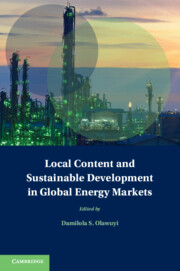Book contents
- Local Content and Sustainable Development in Global Energy Markets
- Reviews
- Treaty Implementation for Sustainable Development
- Local Content and Sustainable Development in Global Energy Markets
- Copyright page
- Contents
- Preface and Acknowledgements
- Abbreviations
- Editor
- Contributors
- Part I Introductory Context and Principles
- Part II Case Studies
- 6 Expressing Local Content through Black Economic Empowerment in the South African Petroleum Industry
- 7 Local Content Frameworks for Petroleum Industry Operations in the CEMAC Region: An Evaluation of Their Functionality, Sustainability and Normative Underpinnings
- 8 Local Content, Angolanização, and Sustainable Development in Angola
- 9 Local Content and the Sustainable Development of Oil and Gas Resources in Nigeria
- 10 Local Content Requirements and Treaty Implementation in Kenya’s Petroleum Sector
- 11 Sustainability and Local Content Requirements in Australian Oil and Gas Development: Has the Ship of Opportunity Sailed?
- 12 Local Content for Sustainable Development in Middle East and North Africa: Current Legal Approaches and Future Directions
- 13 Local Content and Sustainable Development in Norway
- 14 Local Content and Sustainable Development in Argentina
- 15 The Latin American Experience in Designing Local Content Policies in the Oil and Gas Sectors: Strengths, Limitations, and Future Perspectives
- 16 Local Content and Sustainable Development in Brazil
- 17 Industrial Policy and Local Content Rules in US Energy Policy
- 18 Oil and Gas Sector Local Content Decision Processes: Canadian Indigenous Participation
- Part III Lessons Learned and Future Directions
- Index
7 - Local Content Frameworks for Petroleum Industry Operations in the CEMAC Region: An Evaluation of Their Functionality, Sustainability and Normative Underpinnings
from Part II - Case Studies
Published online by Cambridge University Press: 05 March 2021
- Local Content and Sustainable Development in Global Energy Markets
- Reviews
- Treaty Implementation for Sustainable Development
- Local Content and Sustainable Development in Global Energy Markets
- Copyright page
- Contents
- Preface and Acknowledgements
- Abbreviations
- Editor
- Contributors
- Part I Introductory Context and Principles
- Part II Case Studies
- 6 Expressing Local Content through Black Economic Empowerment in the South African Petroleum Industry
- 7 Local Content Frameworks for Petroleum Industry Operations in the CEMAC Region: An Evaluation of Their Functionality, Sustainability and Normative Underpinnings
- 8 Local Content, Angolanização, and Sustainable Development in Angola
- 9 Local Content and the Sustainable Development of Oil and Gas Resources in Nigeria
- 10 Local Content Requirements and Treaty Implementation in Kenya’s Petroleum Sector
- 11 Sustainability and Local Content Requirements in Australian Oil and Gas Development: Has the Ship of Opportunity Sailed?
- 12 Local Content for Sustainable Development in Middle East and North Africa: Current Legal Approaches and Future Directions
- 13 Local Content and Sustainable Development in Norway
- 14 Local Content and Sustainable Development in Argentina
- 15 The Latin American Experience in Designing Local Content Policies in the Oil and Gas Sectors: Strengths, Limitations, and Future Perspectives
- 16 Local Content and Sustainable Development in Brazil
- 17 Industrial Policy and Local Content Rules in US Energy Policy
- 18 Oil and Gas Sector Local Content Decision Processes: Canadian Indigenous Participation
- Part III Lessons Learned and Future Directions
- Index
Summary
The Central African Economic and Monetary Community (CEMAC) is a central regional community comprising of six member states. With the exception of the Central African Republic, the other five member states are producers and net exporters of crude petroleum with a combined regional output of over 964,000 bpd. Although richly endowed, this resource abundance has yet to transform into economic prosperity for the region. CEMAC countries remain mired in poverty, underdevelopment, and endemic political corruption – the chief hallmarks and symptoms of the ‘resource curse’ thesis. Local pockets of resistance against perceived distributive injustice is increasingly leading to resource conflict. It is against this background that local content requirements (LCRs) for the petroleum sector could be seen as a possible panacea in addressing, at least in part, some of these endemic problems. Localization undoubtedly offers a wide range of employment and business opportunities for citizens, domestic enterprises, and the whole economy. Petroleum sector LCRs in CEMAC countries are typically embedded in petroleum legislation as a standard regulatory feature. But notwithstanding their often ambitious aspirations, LRCs have produced questionable results in terms of local value creation for CEMAC economies. As imported regulatory tools, LCRs have struggled to take root in CEMAC environments, thus suffering the same ‘localization’ problem that has been endemic to legal transplantation of foreign legislative or regulatory concepts. The results have been discouraging.
This chapter argues for a shift away from the traditional bureaucratic model of LCRs with its tendency to parody foreign models, towards embracing more innovative and holistic approaches to designing bespoke LCRs aimed at promoting the ethos of regional integration within the spirit of Global South cooperation. It further argues the need for greater emphasis on functionality, sustainability and normative approaches aimed at enabling effective enforcement. At the forefront of the proposed regionalised approach to LCR strategies in CEMAC would be viable criteria for the measurability of local content benchmarks and milestones vis-à-vis the functionality and implementation of sustainable petroleum sector LRCs in the CEMAC region.
- Type
- Chapter
- Information
- Publisher: Cambridge University PressPrint publication year: 2021

